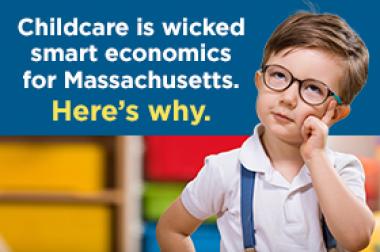
In 1852, Massachusetts became the first state in the nation to provide statewide public schooling. The rest of the country followed.
Since then, public school districts have grown into stronger and better-funded systems. In 2022, Massachusetts spent $18,471,917,000 on the education of children in grades kindergarten through high school. Worcester Public Schools spent $466,801,954.33 at a rate of $17,315.90 per pupil. (Find your school district.)
We’re not here to quarrel with this. We’re here to support it.
Increased investment in affordable, high-quality childcare will improve school readiness in young children, aiding WPS’s mission of preparing youth for careers and college. And let’s not forget the impact of childcare on families’ earning power and our state’s workforce, businesses, and communities.
Let’s do the math.
Every $1 spent on early childhood education and care yields a $13 return on investment in educational attainment, employment, health, truancy, and criminality. Even general economic activity increases by $8.60 for every $1 spent on childcare.
Talk about ROI! It’s no wonder the Massachusetts Taxpayers Foundation supports greater childcare investments.
Take action: Edward Street urges you to tell your State Legislators to co-sponsor HD. 2795 and SD. 667. These bills are good for children and make good economic sense.
Childcare does something k-12 systems can’t—prepare young children for k-12 systems
Study after study has linked early childhood education and care to school readiness.
Children who attend high-quality programs see greater gains in math and literacy in kindergarten that persist until at least age 15. They are even more likely to graduate high school, take the SAT, enroll in college, and, by age 26, achieve higher levels of employment.
The benefits of early education and care are so powerful that entire elementary school classrooms see larger gains in vocabulary and inhibitory control when childcare alums are present.
How’s that for making the most of your education tax dollars?

Take action: 1.) Attend the Common Start Coalition’s Lobby Day at the State House on March 22nd and 2.) Tell your State Legislators to co-sponsor HD. 2795 and SD. 667.
Childcare improves families’ earning power and grows the workforce
Affordable childcare would have an immediate and long-lasting impact on family earnings and economic development in Worcester and statewide.
For women with two children, the addition of affordable childcare would increase lifetime earnings by an estimated $97,000. Collectively, about 1.3 million women in the U.S. would experience an estimated $130 billion boost in income over their lifetimes.
Businesses would also benefit, as more parents would enter the workforce at a time of chronic staffing shortages. The number of women working full-time would increase by about 17% while the number of women working without a college degree would jump by about 31%. According to a 2020 study, a 10 percent increase in child care subsidies would yield a 2 percent increase in employment among married mothers.

Take action: Business owners, parents, and workers, make your voices heard. Tell your State Legislators to support HD. 2795 and SD. 667.
Childcare makes communities safer, individuals healthier, and may create savings in other areas
Could childcare funding reduce government spending in areas like corrections and healthcare?
It’s certainly possible. Individuals who attend a high-quality childcare program are less likely to enter either the juvenile justice system or criminal justice system. Childcare alums are even healthier than their peers who did not attend high-quality programs.
Childcare affordability helps solve gender and racial inequality and systemic poverty
Communities of color have been disproportionately impacted by poor childcare access for generations, but today’s business environment features a new wrinkle.
Many workers of color serve their communities in frontline care and service positions while their white counterparts access remote and hybrid remote job positions that allow them to earn a living—and care for children—from home.
It’s time to do the smart thing and level the playing field for all Massachusetts children and families.
Childcare leadership in the U.S. starts in Massachusetts
Massachusetts was the first state to create statewide public schooling more than 170 years ago.
Let’s finish the job. Let’s take another step towards universal, affordable childcare, and increase our taxpayer ROI. Let’s be wicked smart!
Here’s how:
1.) Urge your State Legislators to co-sponsor HD. 2795 and SD. 667.
2.) Attend the Common Start Coalition’s Lobby Day at the State House on March 22nd.
3.) Share this blog with friends, family, co-workers, and local business and community leaders.
Let’s go, Massachusetts! We can do this!
